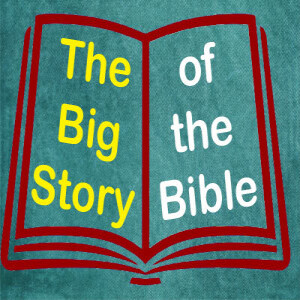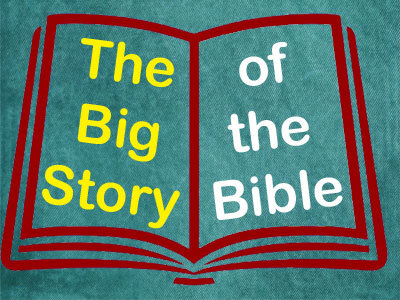
432.4K
Downloads
3363
Episodes
G’day and welcome to Partakers Christian Podcasts! Join us for uplifting Bible teaching, inspiring readings, heartfelt worship, powerful prayers, and fascinating church history. Whether you’re new to faith or growing deeper in your journey, we’re here to encourage and equip you. 🎧 Tune in, interact, and be inspired—wherever you are in the world.
G’day and welcome to Partakers Christian Podcasts! Join us for uplifting Bible teaching, inspiring readings, heartfelt worship, powerful prayers, and fascinating church history. Whether you’re new to faith or growing deeper in your journey, we’re here to encourage and equip you. 🎧 Tune in, interact, and be inspired—wherever you are in the world.
Episodes

Friday Nov 17, 2023
The Big Story - Part 7
Friday Nov 17, 2023
Friday Nov 17, 2023

Big Story - Act 4 Scene 2: The death of Jesus
with Roger Kirby
And so we come to the pivotal moment of history. It is hard to know what to write about it. In all probability anyone and everyone who listens to this, or reads it, will know the details of what happened and if I am telling the story of the Bible this is perhaps not the best place to go into the detail of what the death of the Son of God on the Cross meant. What I am going to do, therefore, is try to relate the great event to all that has happened in the Great Story so far.
We started with Creation. The fundamental point of Genesis chapter 1 is that men and women are made in the image of God and therefore are uniquely endowed with conscience and insight into all that surrounds them and happens to them. If we are made in the image of God then it follows that it is possible for God to walk this earth in the form of a man, as indeed he did in Jesus, the embodiment of God in human form. He died as the Son of God and as a human being.
Next came the Fall, when mankind started to show their persistent tendency to disobey God and to fail to live well with each other. Jesus did not sin. The writer to the Hebrews says: “we do not have a high priest who is unable to sympathize with our weaknesses, but we have one who in every respect has been tempted as we are —yet without sin.” Jesus died, falsely accused of plotting to destroy the temple, committing blasphemy and threatening insurrection against Rome. None of those things were true – at least in the way those who heard him interpreted them. This was the pivotal moment when the Fall was reversed – at least in potential.
The commission and promise given to Abraham were designed to begin the process of calling the whole world, all mankind, back to obedience to God the Lord. The great commission then moved on to his family and then the 12 tribes of Israel.
They were redeemed out of Egypt to show the power of redemption and to set them on the long and difficult path of obedience to the Lord that they had in their midst as they travelled through the wilderness.
But they failed. They began to fail at the very beginning, in the episode when they worshipped the golden calf as their saviour from Egypt - and from there it was all downhill. Eventually the visible presence of the Lord in the centre of the nation had to be removed from them. It could get no worse. All they were left with was the promise of a man, a Messiah, anointed of God, who would, they thought, restore them as a kingdom and a nation.
But when the Messiah, Jesus, came he had quite other purposes and plans. They did not recognize him, largely because those purposes and plans were so very different from those they expected him to have. He was not a warrior leader. He did not challenge the hated Romans. He was a peaceful bringer of healing, who taught the value of peacefulness, calm, good inter personal relationships and love; all these things were part of the Kingdom he was introducing; all would only be attained by submission to the Lord God and to himself. He taught that the way up to communion with the Lord God was down to service and faithfulness.
All this strange and entirely unexpected mixture of attributes came together in the person of the prophet from Galilee, Jesus. The move back to God away from the primeval sin of mankind had started with one man, Abraham. It had continued through, first, one family – that of Jacob/Israel, then 12 tribes, the nation of Israel. But they had all failed miserably through many centuries to carry out Abraham’s great commission so it came back down onto the shoulders of just one man, the perfect, obedient Israelite, Jesus. Only he could atone for both the original Fall and the consequent failure of all men and women to live in true obedience to the One and Only Lord God.
This was the Glory of the Cross. That was the deepest depths of degradation, but in it we see the Son of God, God himself, lifted up for all the world to see, to follow and obey.
Ever since mankind has struggled to express the full meaning of what happened there. Two main ideas have dominated: atonement and victory. Atonement is to make a satisfactory payment for something done wrong, in this case a sacrifice. It makes what was separated ‘at one’ (as the word suggests), in this case to bring together the sinner and his Lord in spite of the fact that one is sinful and the other pure and holy. Victory, expressed in the Latin tag ‘Christus victor’, represents the idea that at the Cross Jesus conquered all that was against mankind. This could only be in potential as sin is clearly still rampant in the world; and in potential as the final victory for the believer will only be achieved on death and entry into the life after death.
So what? We live in the shadow of the Cross. A very old hymn says:
“What language shall I borrow
To thank Thee, dearest Friend,
For this Thy dying sorrow,
Thy pity without end?"
It is hard to think of a better way of putting it than that. Another hymn says:
“In the cross of Christ I glory,
towering o'er the wrecks of time;”
And we can do no better than that - Glorying in the Cross. An amazing thing to do. Funny how many people wear a miniature of a scaffold round their necks and churches put a replica high on their building! But that is part of ‘the way up, is down’. As we do that glorying we shall find that our hearts and minds are strangely warmed. Thank you – Jesus, Lord and Saviour.

No comments yet. Be the first to say something!